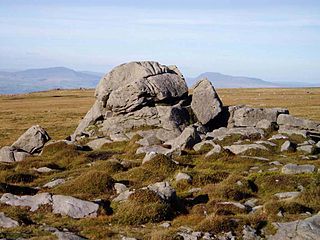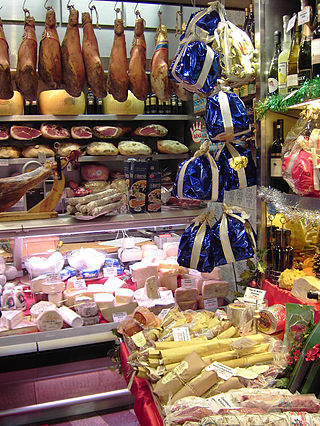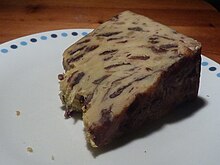
Lancashire is a ceremonial county in North West England. It borders Cumbria to the north, North Yorkshire and West Yorkshire to the east, Greater Manchester and Merseyside to the south, and the Irish Sea to the west. The largest settlement is Blackpool, and the county town is the city of Lancaster.

The Forest of Bowland, also known as the Bowland Fells and formerly the Chase of Bowland, is an area of gritstone fells, deep valleys and peat moorland, mostly in north-east Lancashire, England, with a small part in North Yorkshire. It is a western outlier of the Pennines.

Traditionally, a delicatessen or deli is a retail establishment that sells a selection of fine, exotic, or foreign prepared foods. Delicatessens originated in Germany during the 18th century and spread to the United States in the mid-19th century. European immigrants to the United States, especially Ashkenazi Jews, popularized the delicatessen in U.S. culture beginning in the late 19th century what is now known as a Jewish deli. Today, many large retail stores like supermarkets have deli sections.

Ribble Valley is a local government district with borough status within the non-metropolitan county of Lancashire, England. The total population of the non-metropolitan district at the 2011 Census was 57,132. Its council is based in Clitheroe. Other places include Whalley, Longridge and Ribchester. The area is named after the River Ribble, which flows in its final stages towards its estuary near the Preston. The area is popular with tourists who enjoy the area's natural unspoilt beauty, much of which lies within the Forest of Bowland.

Parlick is an approximately cone-shaped steep-sided hill at the extreme south of the main range of Bowland fells in Lancashire, England. Its bog-free sides make it more popular with walkers than the shallow boggy hills to its north. Paths zigzag up this hill from the south, or for the more strenuous ascent a straight path can be chosen. This hill is usually green — different from the often thorny brown to red of the northern hills. A thin neck joins Parlick onto Fair Snape Fell with well-worn paths linking the two.

Pendle Hill is in the east of Lancashire, England, near the towns of Burnley, Nelson, Colne, Brierfield, Clitheroe and Padiham. Its summit is 557 metres (1,827 ft) above mean sea level. It gives its name to the Borough of Pendle. It is an isolated hill in the Pennines, separated from the South Pennines to the east, the Bowland Fells to the northwest, and the West Pennine Moors to the south. It is included in a detached part of the Forest of Bowland Area of Outstanding Natural Beauty.

Bleasdale is a village and civil parish in the Wyre district of Lancashire, England, in the Forest of Bowland Area of Outstanding Natural Beauty. The two sources of the River Brock lie within the parish. According to the 2001 census, it had a population of 147, increasing to 167 at the 2011 Census.

Goosnargh is a village and civil parish in the City of Preston district of Lancashire, England.

Stinking Bishop is a washed-rind cheese produced since 1972 by Charles Martell and Son at Hunts Court Farm, Dymock, Gloucestershire, in the west of England. It is made from the milk of Gloucester cattle.

Quernmore is a village and civil parish in the City of Lancaster in Lancashire, England. It is located about 3 miles (5 km) east of Lancaster. The parish of Quernmore had a population of 532 recorded in the 2001 census, increasing to 567 at the 2011 Census. Apart from Quernmore itself, the parish also includes Brow Top, once a local crafts mecca, now barn conversions.

Chipping is a village and civil parish of the borough of Ribble Valley, Lancashire, England, within the Forest of Bowland Area of Outstanding Natural Beauty. In the 2001 census, the parish had a population of 1,046, falling slightly to 1,043 at the 2011 Census. This Lancashire village has won several best-kept village competitions over the years. The village also won the village section of the Royal Horticultural Society Britain in Bloom competition in 2009 picking up RHS Tourism and Gold achievement awards in the process.

Beacon Fell is a fell in the civil parish of Goosnargh in Lancashire, England. The high ground, which rises to 266 m (873 ft), has been a country park since 1970. It is situated within the south westerly part of the Forest of Bowland, an Area of Outstanding Natural Beauty.

Calder Vale is an English village, located on the edge of the Forest of Bowland in Lancashire. It lies on the River Calder in a deep valley with only a single road providing vehicular access. The name Calder is thought to be derived from the Old Norse kaldr, which means "cold".

Whitewell is a village within the civil parish of Bowland Forest Low and Ribble Valley borough of Lancashire, England. It is in the Forest of Bowland Area of Outstanding Natural Beauty. Historically, the village fell just within the boundaries of the West Riding of Yorkshire. It was transferred to Lancashire for administrative purposes on 1 April 1974, under the provisions of the Local Government Act 1972. It stands above a bend in the River Hodder.

Grindleton is a village and civil parish in the Ribble Valley district of the English county of Lancashire, formerly in the West Riding of Yorkshire. Its 3,700 acres sit within the Forest of Bowland. The population of the civil ward taken at the 2011 census was 772.
The Cheese Shop, Louth is an artisan delicatessen situated in Louth, England, known for its large selection of artisan foods, especially cheese. The Cheese Shop has been featured in national newspapers such as The Daily Telegraph and its magazine and The Guardian, local radio and television on BBC Lincolnshire and BBC Look North, and national television episodes in The Hairy Bikers' Food Tour of Britain.

Browsholme Hall is a privately owned Tudor house in the parish of Bowland Forest Low in the borough of Ribble Valley, Lancashire, England. It is claimed to be the oldest surviving family home in Lancashire. Since 1954, it has been designated a Grade I listed building by English Heritage.















